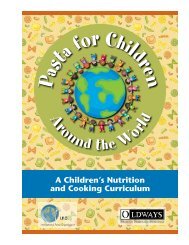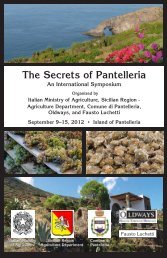Turkey's Culinary Heritage - Oldways
Turkey's Culinary Heritage - Oldways
Turkey's Culinary Heritage - Oldways
You also want an ePaper? Increase the reach of your titles
YUMPU automatically turns print PDFs into web optimized ePapers that Google loves.
Yogurt<br />
Turkey is a nation of yogurt lovers. Most of the countries milk production<br />
goes towards making yogurt.<br />
Made from cow, goat, sheep and water buffalo<br />
milk, yogurt devotees will know that the higher<br />
fat content of the latter three animals makes<br />
even more delectably creamy yogurt. Yogurt<br />
appears on the table at every mealtime and<br />
is served with just about anything, including<br />
soups, stews, kebabs, pilavs, stuffed vegetables<br />
and salads.<br />
Yogurt is one of the most ancient foods known<br />
to man. Evidence exists of fermented milk<br />
products being produced almost 4500 years<br />
ago, and the Turks are just one of many peoples who like to claim responsibility<br />
for its creation.<br />
In Turkish markets and dairy shops, you’ll generally find two kinds of<br />
yogurt; sivi tas and suzme. Sivi tas is the standard yogurt and can vary in<br />
consistency from fairly runny to thick and creamy. It’s used to make most<br />
yogurt-based sauces and is diluted with iced water to make ayran. Suzme<br />
is very firm strained yogurt that’s made by hanging sivi tas in a muslin bag<br />
overnight to drain away the whey. This is also called labne in Arabic.<br />
Ayran<br />
Greg and Lucy Malouf<br />
Turquoise: A Chef’s Travels in Turkey<br />
Turkey and the Middle East, the yogurt drink ayran is popular with<br />
In meat kabobs but I like it best served chilled for breakfast at the start of<br />
a hot day.<br />
For 1 long, tall glass:<br />
thick, plain strained yogurt,<br />
iced water, ice cubes, salt, and dried mint<br />
Half fill the glass with thick yogurt and top up to twothirds<br />
full with iced water. Stir well—it should have<br />
the consistency of thick cream. Add a couple of ice<br />
cubes, stir in a little salt, to taste, and a touch of dried<br />
mint. Leave to stand for 5 minutes, then drink.<br />
Sarah Woodward<br />
The Ottoman Kitchen: Modern Recipes from Turkey,<br />
Greece, the Balkans, Lebanon, Syria, and Beyond<br />
Dondurma<br />
The famous turkish “stretch” ice cream. Dondurma is a pounded ice<br />
cream and that unique stretchiness comes from mastic (plant resin)<br />
and sahlep (an extract of orchid root).<br />
Maraş is the true home of ice cream. The goats, sheep and cows that graze<br />
in the nearby mountains produce the country’s sweetest milk, and the wild<br />
orchids that contain sahlep also grow in the mountain pastures. In fact,<br />
maraş dondurma is more than just stretchy. The ice cream is firm enough<br />
to be eaten with a knife and fork and is almost hard and chewy but still<br />
melts in your mouth.<br />
Turkish Tea<br />
Turkish tea is traditionally served in small, tulipshaped<br />
glasses with a rounded bowl at the bottom.<br />
The glass is placed on a saucer (often decorate<br />
with lurid flower patterns), together with two<br />
or three sugar lumps for you to add to taste. If your<br />
taste is Turkish, then the sweeter the better. The<br />
tea is always served without milk and strong and<br />
although the first glass may be at breakfast time,<br />
it is served throughout the day and late into the night. In the bazaars the<br />
tea-carriers are a familiar sight, swinging metal trays loaded with glasses at<br />
a seemingly impossible angle.<br />
For the industrial quantities consumed at the bazaars, the tea is usually<br />
made in a samovar. To make it at home, warm a small teapot (preferably<br />
metal), add 3 teaspoons strong, black tea, top up with boiling water and<br />
leave to stand for 5 minutes. Pour from a height into small glasses (a few<br />
tea leaves don’t matter), add sugar and drink as soon as you can bear to<br />
pick up the glass.<br />
Sarah Woodward<br />
The Ottoman Kitchen: Modern Recipes from Turkey,<br />
Greece, the Balkans, Lebanon, Syria, and Beyond<br />
24 25




